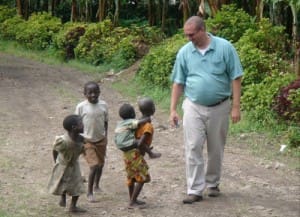Her story rocked me, and still hits me hard today. But more than her story, it was her attitude and resilience that stood out most.
 Getting out to meet the clients is exciting because we get to meet them where they work. This part of the trip in Kenya was pretty eye opening for me, so I had a good feeling about doing it here in Uganda.
Getting out to meet the clients is exciting because we get to meet them where they work. This part of the trip in Kenya was pretty eye opening for me, so I had a good feeling about doing it here in Uganda.
One of the first clients that we met that day was Monica. She worked as a nurse, but she used microloans to help her start and run a small poultry farm. She made enough money as a nurse to support herself, but there is a great need that she needed to meet.
Her poultry farm was quite impressive. She was one of a few people we met that manage the complete loop from hatching her own chicks to harvesting (and selling) the eggs to selling the poultry after their egg-bearing time is over. She sold some eggs in the grocery store, but also sold them out of her living room to the neighbors.
As we sat with her (she insisted on having us stay for tea) she showed us pictures of her family. Her husband had passed away several years ago, so she was all that was left to raise the kids.
 She told us about her husband who, before he died, worked with a local Habitat for Humanity project building houses for area families. Monica had also lost many of her own brothers and sisters to diseases like AIDS. I think that everyone on our team was shocked by how ‘normal’ death is to the people in Uganda.
She told us about her husband who, before he died, worked with a local Habitat for Humanity project building houses for area families. Monica had also lost many of her own brothers and sisters to diseases like AIDS. I think that everyone on our team was shocked by how ‘normal’ death is to the people in Uganda.
But with so many family members dying she took on the responsibility of raising not only her children (five, if I recall correctly), but also raising many of her nieces and nephews who would have been orphans without Auntie Monica’s help.
So for Monica, microfinance helped her to make some additional income with her small poultry farm so that she could raise these kids. She made money to feed them, and to send most of them to school. Sending them to school was important to her because she knew the impact that a good education would have in helping these kids succeed.
Her example of selflessness moved me pretty deeply. Everything in her life either had to do with loosing the people that were close to her or providing for the children impacted by those losses.
I don’t know if she realizes it or not, but she taught me a lot that day.
But this day wasn’t just about Monica. We visited several other microloan clients and learned about many of their businesses.
We met a tailor and a carpenter who not only made things in their respective trades, but also used funding from microloans to turn their businesses into schools to help train other people in some much needed job skills.
 We also went out to a remote spot in the Rwenzori Mountains on the Uganda/Congo border to visit one of the churches where our teams would be teaching. The mountains that we were in touched the clouds, but even way up there we met people in some of the most extreme poverty that I could have imagined.
We also went out to a remote spot in the Rwenzori Mountains on the Uganda/Congo border to visit one of the churches where our teams would be teaching. The mountains that we were in touched the clouds, but even way up there we met people in some of the most extreme poverty that I could have imagined.
Death seemed to be around every corner.
Hunger was a normal way of life.
There was little to no protection from the elements.
Many had no shoes on their feet.
We even saw a group of people gathered around a young man who seemed to be passed out on the side of the street. The image of that still haunts me, because I know that there were not sufficient medical facilities for quite some distance from where we were. So there was little (if anything) that anyone could do to help him.
The crazy thing about this part of the trip for me was that I saw a land and a people that have every reason to be hopeless. But even in this darkness, there are many shining lights like Monica that give people hope.
Monica showed me that when even when you have nothing in your hand, you can still pour out with your heart.
I know that people like Monica make a difference in people’s lives there in Uganda. And I also know that people like her have made a difference in at least one life all the way over here in the United States.
Thank you Monica.
Check out more from this series in the africa diaries.


0 Comments